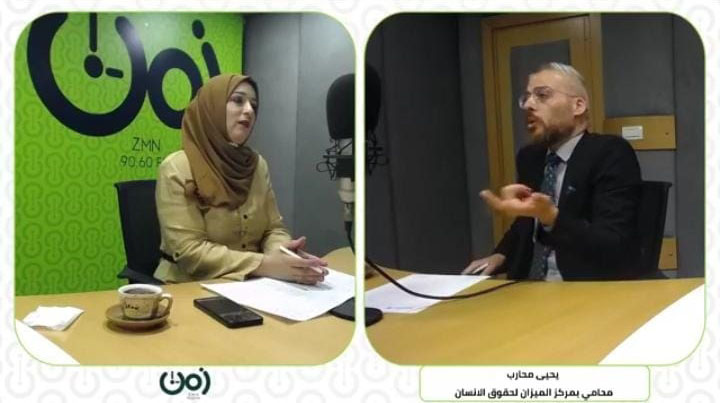Elections are very important since the Palestinian has been suffering from internal conflict for 15 years, and it requires a lot of work to renew the political system that we seek to present to the Arab and international community to tell them that we are entitled and capable of self-determination.” With this saying, the lawyer of the Al-Mezan Center for Human Rights Mr Yahya Mhareb began his talk during a broadcast on Zaman radio entitled “The Role of Human Rights and Community Institutions in Lobbying for the Completion of Elections” within the “Electoral Issues” programme.
The programme is being implemented by Pal-Think for Strategic Studies within the project ” Empowering Civil Society Role to Achieve Palestinian Elections”,” funded by the Government of Canada. This project aims to strengthen the role of civil society, activate the role of youth and enhance their political and community participation in support of elections.
Mr Mhareb added that despite some reservations on the part of civil society on the electoral law, such as the fact that an employee is forced to resign and that he is admitted to a list of elections because this is contrary to Palestinian basic law. Then he stressed that they have a Palestinian basic law equivalent to the Constitution, which states that everyone has rights beyond his political opinion, belief and social status. He further noted that civil society organizations have submitted a petition in the observations on the electoral decree on elections, including the reduction of the age of candidacy, which is 28 years for the Legislative Council and 40 years for the Presidency.
Mr Mhareb explained that the Electoral Commission had administrative and financial powers to establish everything that was relevant to the electoral process. The Mezan Centre for Human Rights asked about the mechanism for the functioning of the Election Commission in quarantine centres because of COVID-19. The response was that there would be no ballot boxes for quarantined patients and prisoners who would be deprived of their rights.
Then he noted that they made a legal request to review the law, so that they could go to the election’s court. Besides, he highlighted that they are about thousands who would be denied election rights because of the lack of planning of the election commission, which is against the law.
He then stated that they appealed to the Electoral Court, and they obtained a decision to require the Electoral Commission to have ballot boxes and to organize the voting process for inmates both in prisons and in quarantine centres.
The Electoral Court is governed by Law No. 1 of 2007, considers all legal challenges submitted to it and has the power to appeal the decisions of the Electoral Commission.
Mr Yahya also stated that the 2007 election decision stipulated that each candidate must resign. And there would be no candidate for the staff member except by accepting his or her resignation, and that he or she should accept the resignation and terminate his or her career. This is more a political than a legal objective, and comments have been made on this item by 120 legal institutions of the President. Many competent candidates have declined to stand for election because of this requirement, which is also contrary to Palestinian basic law.
Regarding the postponement of union elections for six months in March 2021, the lawyer pointed out they believe that this is against the law and that there is no need to do so. Because union elections give hope to all categories of Palestinians that they can change. He further said that there’s no legal justification for postponing elections in unions. On the contrary, it’s against the Constitution, it’s purely political.
Mr Mharab noted that there were legal ways to lobby for legislative and presidential elections as soon as possible and then National Assembly elections: Submission of a petition to the President or a legal position paper on the Palestinian political situation for all Palestinian factions that will write the Charter of Honour to regulate the future state of the Palestinian question. Accordingly, political interventions are broader than legal interventions, because human rights organizations have reservations about the Constitution of the Constitutional Court by the President and observations on the Association Act.
He added that using social media, protesting in the streets and demanding peacefully, media interventions, training and awareness – raising for university students, and legal interventions. Also, recourse to Palestinian factions will have more satisfactory and positive consequences than recourse to a constitutional court.
Mr Mhareb concluded by saying that Human rights organizations and civil society have a moral and legal duty to control the right of citizens to exercise their right to vote and stand for election as soon as possible.
“The designations employed and the representation of material in this program do not imply the expression of any opinion whatsoever on the part of the Government of Canada.”

